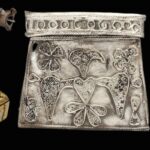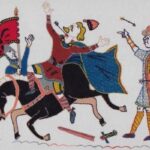We spend a lot of time talking about Viking warriors, but often, it is the opponent that makes the warrior. Where is the glory without a formidable foe? To many Vikings in the second half of the 9th century, Alfred the Great, the King of Wessex, was that foe.
Alfred the Great is largely considered responsible for repelling Danish Vikings raids of England in the last 30 years of the 9th century. His success against the Vikings is why Assassins Creed has picked the king as their ultimate antagonist in their new game Valhalla.
But what exactly do we know about this king and his interaction with the Vikings?
Who was Alfred the Great?
Born in 849 in Wantage in Berkshire, Alfred the Great was the fifth son of Aethelwulf, the King of Wessex. Nevertheless, Alfred succeeded to the throne of his father as it was agreed that power would pass through Aethelwulf’s sons, rather than from father to oldest son and then to grandson.
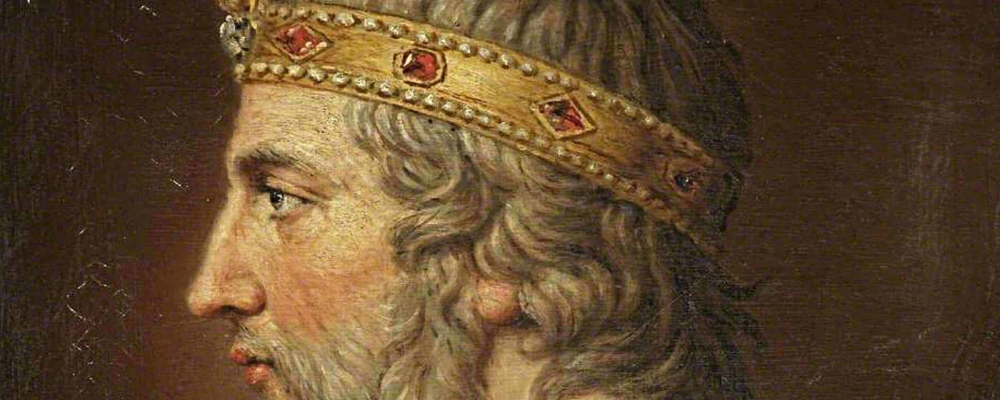
This is because Danish Vikings had been busy raiding England since 790 and posed a genuine threat to Wessex. The Saxons decided that they could not risk child-kings at a time of such great threat. So power was passed through the brothers to ensure their ruler was ready to fight.
As such, despite being a younger son, Alfred would have had a warrior’s upbringing. In 868, at the age of just 19, we know that he fought alongside his brother Aethelred, the current King of Wessex, against the Danish Vikings as they attacked their ally Mercia.
Repelling the Vikings
Alfred succeeded his brother Aethelred as the King of Wessex in 871 when Aethelred was killed in a Danish invasion of Wessex. While he was burying his brother, the Danes defeated his Saxon army in his absence. Alfred was forced to make peace, paying the Vikings to leave the Wessex territory.
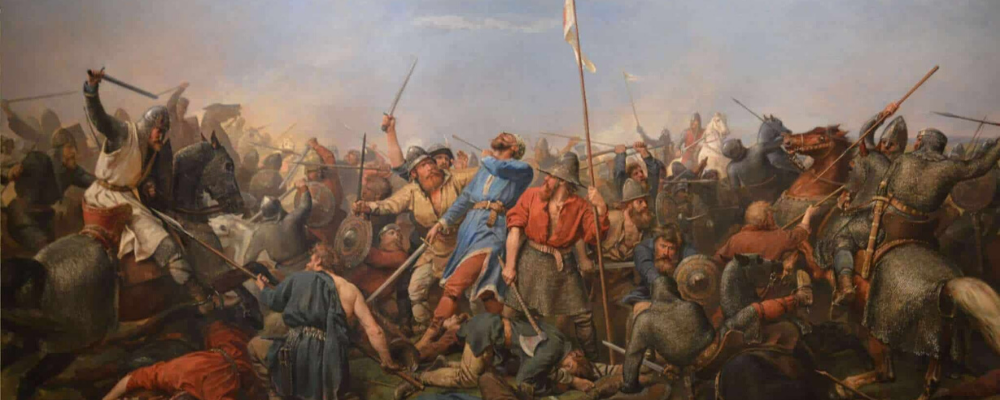
But this would only mark the start of Alfred’s campaign against the Danish Vikings. The Danish Vikings left Wessex alone for five years, time which Alfred used to prepare.
The Danes, under the leadership of their chiefs Guthrum, Oscetel, and Anwend, advanced on Wessex again in 876 and took Wareham in Dorset. Alfred blockaded them within the city and was able to negotiate another peace with the Vikings through an exchange of hostages.
But the Danes, despite swearing an oath on the “holy ring” associated with Thor, broke their word and killed the hostages. That was the end of peace, and Alfred went on to defeat the Danish Vikings on several fronts.
The Vikings took Chippenham, one of Alfred’s strongholds, killing many of Alfred’s men. But he responded by cutting off their supply line by blockading their ships and setting up a new fort at Athelney in the Somerset marshes. By 878, of all the English powers in the area, only Alfred was holding out against the Vikings.
In that same year, Alfred rode to Egbert’s Stone, where he gathered people from Somerset, Wiltshire, and Hampshire to form a new army.
With his new army, he won a decisive victory over the Danes at the Battle of Edington, and then starved them into submission in their stronghold at Chippenham.
The Vikings were forced to surrender, and Guthrum and 29 of his leading warriors forced to convert to Christianity with Alfred as their sponsor. The Danes were forced to leave Wessex and set themselves up peacefully in Cirencester.
Consolidating Power
While this would not be the last time that Alfred would battle with the Vikings in England, it was a decisive victory that allowed Alfred to consolidate his power.

In 886 he went on the offensive and captured London for himself. In doing so he forced all Englishmen not under Danish rule to accept him as their king.
Alfred went on to regenerate London, making it liveable again, and also to consolidate his defenses. He strengthened old forts and built new ones on strategic sites, and he ensured that his important forts were manned at all times.
He reorganized his armies to make them more effective, and also met Viking invaders on the water with ships of his own. He even had new, larger ships built based on his own designs to better combat the Vikings.
The Continental Viking Invasion
All of this meant that in the 890s, when Danes from the European mainland attacked, Alfred was ready. In 892 or 893 the Danish Vikings made their way from Europe to England in 330 ships broken into two divisions. Upon landing they entrenched themselves at Appledore and Milton, both in Kent.

There were several battles, skirmishes, and attempts at negotiations with Hastein, one of the leaders of the Vikings, over the next three years.
But, in 895, due to a lack of food, the Danish Vikings were forced to draw their ships up the rivers Thames and Lea and fortify themselves about 20 miles north of London. Alfred took this opportunity to obstruct the rivers and prevent the Danish ships from passing. Realizing that they were outmaneuvered, the Vikings gave in. Some settled peacefully in Northumbria and East Anglia, while many returned to continental Europe.
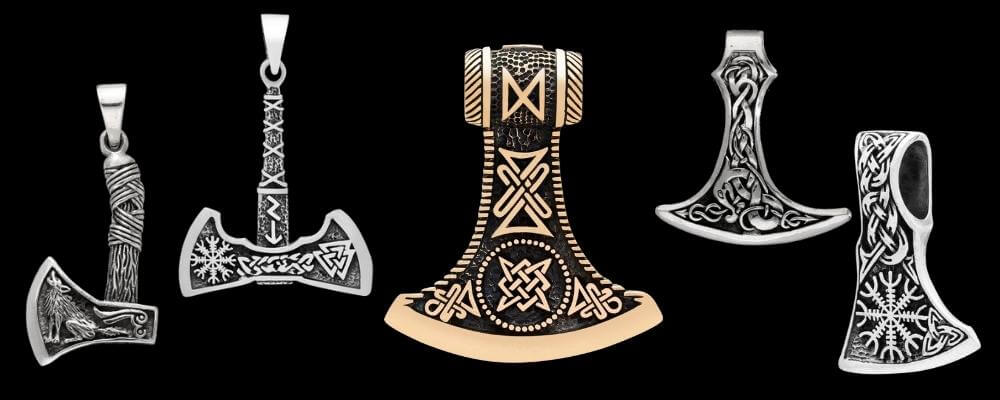
Alfred the Ruler
As well as being an excellent tactician, as his dealings with the Vikings demonstrates, Alfred is considered among the wisest and most benign of England’s kings. For example, he implemented drastic and widespread legal reforms specifically designed to protect the weak from abuse by strongmen.

He also tried to curb violence and infighting among his own people by limiting the legal application of blood feuds and imposing heavy penalties for the breach of an oath of a pledge.
But most importantly, Alfred wanted to ensure that his people were educated.
There are signs that from a young age Alfred had scholastic interests, but he was unable to pursue these until he was king.
After he defeated the Vikings in 879, he invited scholars from throughout England and Europe to his court. He learned Latin and began to translate the, mostly religious, works that he thought were important into English.
After he took London, he encouraged all young men of sufficient means to learn English and made his own translations widely available.
His focus on education and literacy may have partially stemmed from his belief, common at the time among the English, that the Viking raids were divine punishment for their sins. Alfred thought that only through knowledge and wisdom could the English better understand the will of God, and therefore prevent this ongoing scourge.
Alfred the Nemesis
So, Alfred the Great was a nemesis to our Viking heroes and played an essential role in preventing the Danish Vikings from taking England. Who knows, if not for Alfred, perhaps England would be a thoroughly Viking country.
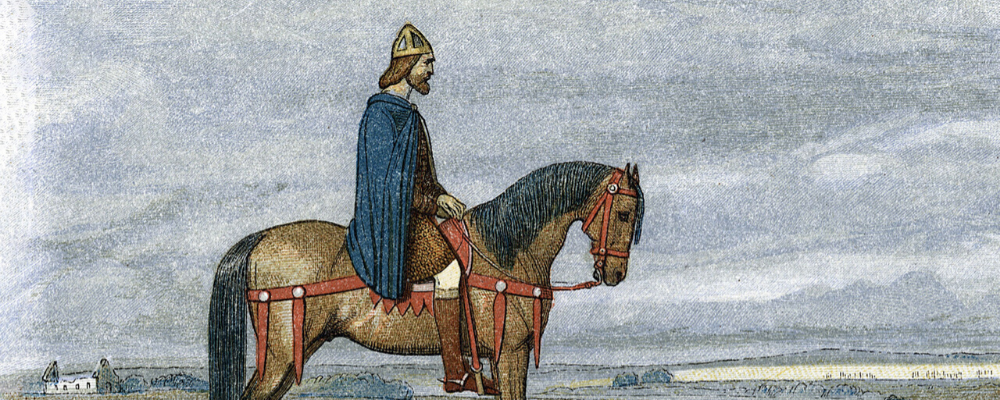
It is no surprise that the makers of the new Assassins Creed game Valhalla have selected Alfred as their big bad boss.
In the game, you play a Viking warrior leading a band from Norway to stake out new territory in England. Alfred will send his troops to stop you.
What do you think? If not for Alfred the Great, would England have become a Viking territory in the 9th century?






